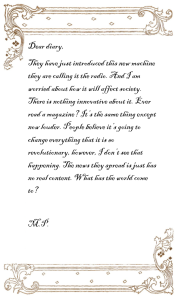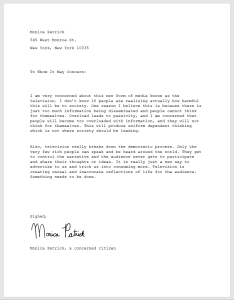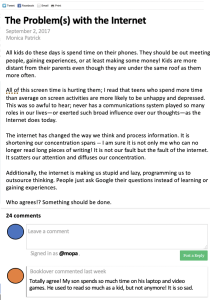2
Heidi Prebys and Julia Quinn
Communication is a vital component of life, serving a purpose in a vast range of contexts (arguably all contexts where interaction plays a role). Thus, developments in methods of communication have an immense impact on humanity. Often, progressions in media have been met with high praise — a wonderful product of creativity, engineering, manufacturing, and collaboration. However, there is also a pattern of panicked responses to these progressions — people concerned about the moral, psychological, and societal impacts of new media. Moral panics about mediums of communication are seen in our contemporary moment with the internet and social media, yet can be traced back through history.
Background
The term “moral panic” was first coined by a South African sociologist named Stanley Cohen in his book, Folk Devils and Moral Panics in 1972. He outlined a theory that involved a five-stage process. The process begins with something or someone that is taken by many people to be threatening to the current social norms of the time. Next, the news and community members depict the threat in an easily understood way that becomes recognizable to the general public. Third, widespread panic is caused and perpetuated by the media. Next, policymakers and authorities respond to the panic by making reforms. Finally, these policies lead to social change in the community. These moral panics have existed throughout time and in a variety of forms. They are typically associated with topics that are seen or claimed to have a moral component.
Moral Panics Throughout Time: A Demonstration
The following section outlines examples of moral panics as they would appear throughout history. The arguments and complaints are drawn from documented panics about the specific medium. These were genuine concerns of some people when these media were introduced.




“Carr – Is Google Making Us Stupid?”, and
“Social Media: The Biggest Threat to Your Brain”
Moral Panics Beyond Media
While new media has caused many major moral panics in today’s world, there have been several times in history where moral panics have occurred. One example of this is the Salem witch trials. This occurred in Massachusetts in 1692 where young girls would have unexplained fits and society would accuse women who were social outcasts of being witches. In this situation, accusations spread once someone disagreed or responded inappropriately. This moral panic largely showed the power that certain individuals had over the community and society. They were able to control the narrative of who was a witch and spread the moral panic throughout the community. Another, more recent example of a moral panic is the “War on Drugs” in the 1980s and 1990s. This was the response to the heightened attention on drug use, specifically crack cocaine. News media focused on the prevalence of crack cocaine and the harmful effects which lead policymakers to pass legislation to try to aggressively eradicate it. Former First Lady Nancy Reagan even participated in drug raids which shows how powerful a moral panic can become. This, like many other moral panics, started with a small, moral issue that someone sees as a threat to the current state of being. It then gets inflated by the media and policymakers and becomes so widespread that the general public becomes very concerned about it. This can be seen in most of the technological innovations that we have seen throughout history such as the invention of the radio, television, internet, and social media. It even occurred back when writing and printing began.
Assessing the Origins
Investigating moral panics — both their conception and sustainment — requires one to look both internally, into the minds and nature of humans, and externally, at our society’s organizations and people of power. Are moral panics genuine concerns originating from the minds of individuals? Or are they false problems created by organizations to incite fear and obtain social control?
Evaluating the internal component requires assessment of the innate human motivation behind moral panics. Like all emotions, panic is a product of evolution — a response developed because of the benefit it provides humans. As we evolved, perceiving and responding to potential threats proved beneficial for survival — if people did not perceive a potential threat or did perceive and failed to respond, they were worse off than those who did both. As a result, we have evolved to be cautious when faced with changes in our environment we deem potentially threatening to our way of life. As the common saying goes: “better safe than sorry.”
External agents such as governments, organizations and people of power can significantly impact the extent to which panics are perceived as a genuine threat. As seen in many different eras, when new media are introduced, organizations and individuals are quick to make judgments. Often, issues that may have originated as slight concerns will be drawn out and amplified. The news media is well known for perpetuating moral panics, often reporting on stories that focus on one aspect of a new threat, without telling the whole story. People typically believe what they hear from prominent organizations and often their coverage of the topic will increase panic about the situation.
The motivation behind this acceleration of moral panics could be one of many things. Perhaps it is out of genuine concern. Perhaps media sites aim to increase viewership at all costs, even if that means exaggeration. Perhaps governmental organizations hope to incite enough concern so that a law must be created (therefore increasing social control).
Throughout history, there are examples of each of these motivations at play. There is no one answer.
References:
“Psycritic.” 1970. “About That Jean Twenge Smartphone Article.” About That Jean Twenge Smartphone Article, January 1, 1970. http://www.psycritic.com/2017/10/about-that-jean-twenge-smartphone-article.html
Ben-Yehuda, Nachman. 2009. “FOREWORD: Moral Panics—36 Years On.” The British Journal of Criminology 49, no. 1: 1–3. http://www.jstor.org/stable/23639651.
Bonn, Scott A. 2015. “Moral Panic: Who Benefits from Public Fear? | Psychology Today.” Moral Panic: Who Benefits from Public Fear?, July 20, 2015. https://www.psychologytoday.com/us/blog/wicked-deeds/201507/moral-panic-who-benefits-public-fear.
Carr, Nicholas.2008. “Is Google Making Us Stupid?” The Atlantic. January 23, 2020. https://www.theatlantic.com/magazine/archive/2008/07/is-google-making-us-stupid/306868/.
Crossman, Ashley. n.d. “A Sociological Understanding of Moral Panic.” ThoughtCo. https://www.thoughtco.com/moral-panic-3026420 (accessed December 1, 2021).
Faye, Cathy. 2018. “A History of Panic over Entertainment Technology.” Behavioral Scientist, January 1, 2018. https://behavioralscientist.org/history-panic-entertainment-technology/.
Frothingham, Mia Belle. 2021. “Moral Panic and Folk Devils (Cohen 1972).” Moral Panic and Folk Devils (Cohen 1972) – Simply Psychology, October 6, 2021. https://www.simplypsychology.org/folk-devils-and-moral-panics-cohen-1972.html.
Mander, Jerry. 2005. “Four Arguments for Eliminating Television.” Four Arguments for Eliminating Television. http://onthewing.org/user/Ev_Four%20Arguments%20for%20Eliminating%20Television.pdf.
Mueller, Milton. 2019. “Challenging the Social Media Moral Panic: Preserving Free Expression under Hypertransparency.” Cato.org, July 23, 2019. https://www.cato.org/policy-analysis/challenging-social-media-moral-panic-preserving-free-expression-under.
“The Radio: Blessing or Curse? A 1929 Debate – America in Class – Resources for History & Literature Teachers from the National Humanities Center.” 2021. America in Class, February 25, 2021. https://americainclass.org/the-radio-as-new-technology-blessing-or-curse-a-1929-debate/.
“Social Media: The Biggest Threat to Your Brain.” 2018. TED, March 2018. https://www.ted.com/talks/social_media_the_biggest_threat_to_your_brain.
Twenge, Jean M. 2018. “Have Smartphones Destroyed a Generation?” The Atlantic. March 19, 2018. https://www.theatlantic.com/magazine/archive/2017/09/has-the-smartphone-destroyed-a-generation/534198/.
Zittrain, Jonathan. 2021. “The Internet Is Rotting.” The Atlantic. June 30, 2021. https://www.theatlantic.com/technology/archive/2021/06/the-internet-is-a-collective-hallucination/619320/.
